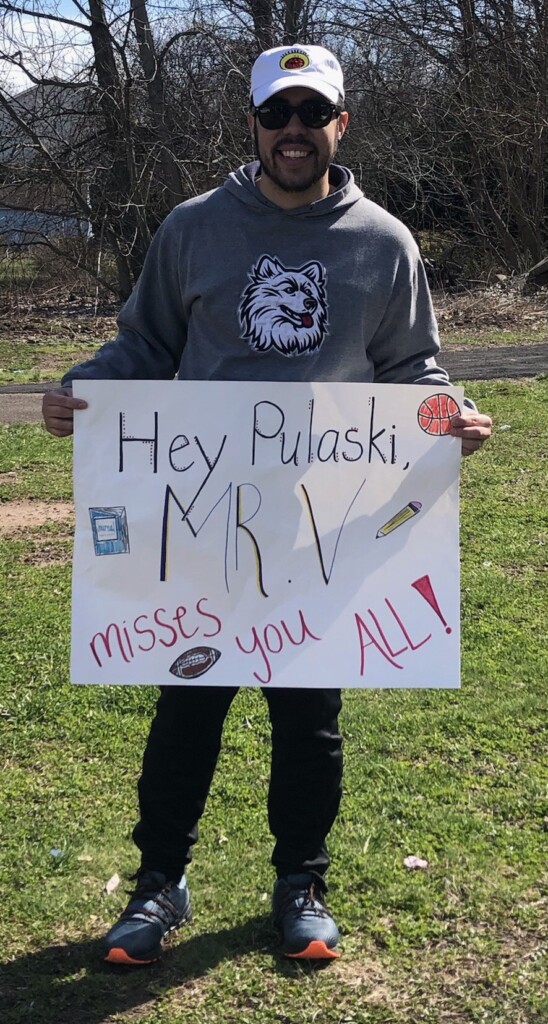Covid-19 has turned teaching upside down.
But Jessica Raugitinane, who is teaching her fourth-graders remotely, has found a way to create a familiar, positive classroom culture despite the distance.

We honored Ms. Raugitinane in 2012 when she was an undergraduate at UConn’s Neag School of Education. She earned her master’s degree in 2014 and has been teaching dual-language English and social studies at Mount Vernon Community School in Alexandria, Va., for several years.
She also trains teachers in her school district in strategies from Project GLAD® (Guided Language Acquisition Design), which promotes English language learning and high academic achievement in a positive classroom culture.
Converting to Remote Learning
Educators have recognized that implementing remote learning requires much more than just placing a computer in front of the teacher.
When the pandemic forced the Alexandria schools to convert to remote learning, Ms. Raugitinane realized she would have to make significant changes. She was determined to ensure that her students would still receive the education they need and deserve. She committed to continue using her successful best practices while adapting them to the virtual world.
“When my school shut down, I had to learn how to command an in-person job through a computer screen,” she said. “Fortunately, my school helped me discover the RULER approach developed at Yale and Larry Ferlazzo’s Seven Tips for Remote Teaching.
“Combined, these techniques solidified my decision to focus on the social emotional needs of my students before diving into academic content. However, applying Project GLAD® strategies enabled me to address my students’ social emotional needs while continuing to develop their language learning.”
Quite a bit of preparation was required. Ms. Raugitinane completed the RULER online training in four hours, then devoted her spring break (10 eight-hour days) to creating the 10-lesson mini-unit plan using the interactive Nearpod website. This included creating the lessons on Google Slides first and then making them interactive with Nearpod.
“I was motivated to invest the time in creating this 10-lesson mini-unit plan so that I would have a reusable template for plugging in future content,” she said. “Later I plugged in the Social Studies content to teach about Jim Crow Laws and segregation. That 10-lesson mini unit plan took me four days, compared to the original 10 days for the first unit plan.
“I wanted to make sure I was applying my knowledge of Project GLAD® strategies and Nearpod to make an interactive, language-rich academic environment, while creating a routine for myself and my students.”
Sharing Her Experience
She recently shared her experience in distance learning in an article in Soleado, a publication of Dual Language Education of New Mexico.
The article provides a wealth of techniques and strategies that will be useful to teachers intent on meeting the needs of their students during this stressful and demanding time. Read the full article.
As she wrote in the article:
“With the global pandemic taking us all on an emotional roller coaster, helping my students navigate their own emotions within this new quarantined world became paramount.
“Fortunately, at the start of the closure, I learned about RULER, an evidence-based, systemic approach to social-emotional learning developed at the Yale Center for Emotional Intelligence (www.ycei.org/ruler).
“RULER stands for the five skills of emotional intelligence: recognizing, understanding, labeling, expressing and regulating. The RULER online training taught the importance of developing students’ emotional literacy. Essentially, providing students with the language of emotions enables them to better identify and express their feelings.
“I also learned the value of asking students the simple question: ‘How are you feeling?’ before beginning a lesson as a way to regulate emotion and encourage more on-task behavior. Undoubtedly, helping students understand and express their emotions during these uncertain times became the heart of my remote teaching.”
Additional Lessons
Among the other lessons she learned in preparing to teach remotely:
- Establishing an equitable and accessible routine provided much-needed consistency for my students and myself.
- Three tips from Larry Ferlazzo’s Seven Tips for Remote Teaching are essential: 1) emphasize social-emotional learning; 2) minimize synchronous online meetings: 3) keep things simple.
- Both RULER and Ferlazzo’s advice prioritize social-emotional connections as a necessary ingredient to academic success, especially during distance learning.
- Ferlazzo’s advice further encouraged me to deliver learning both synchronously and asynchronously in order to provide equity of access to students. And to keep things simple, I focused on teaching a unit’s main concepts rather than attempting to cover a myriad of information.
Congratulations to Jessica Raugitinane for rising to the challenge of remote learning, cultivating new knowledge and skills, and sharing her learnings with fellow professionals who are facing the same daunting challenge.
- Woody Exley


